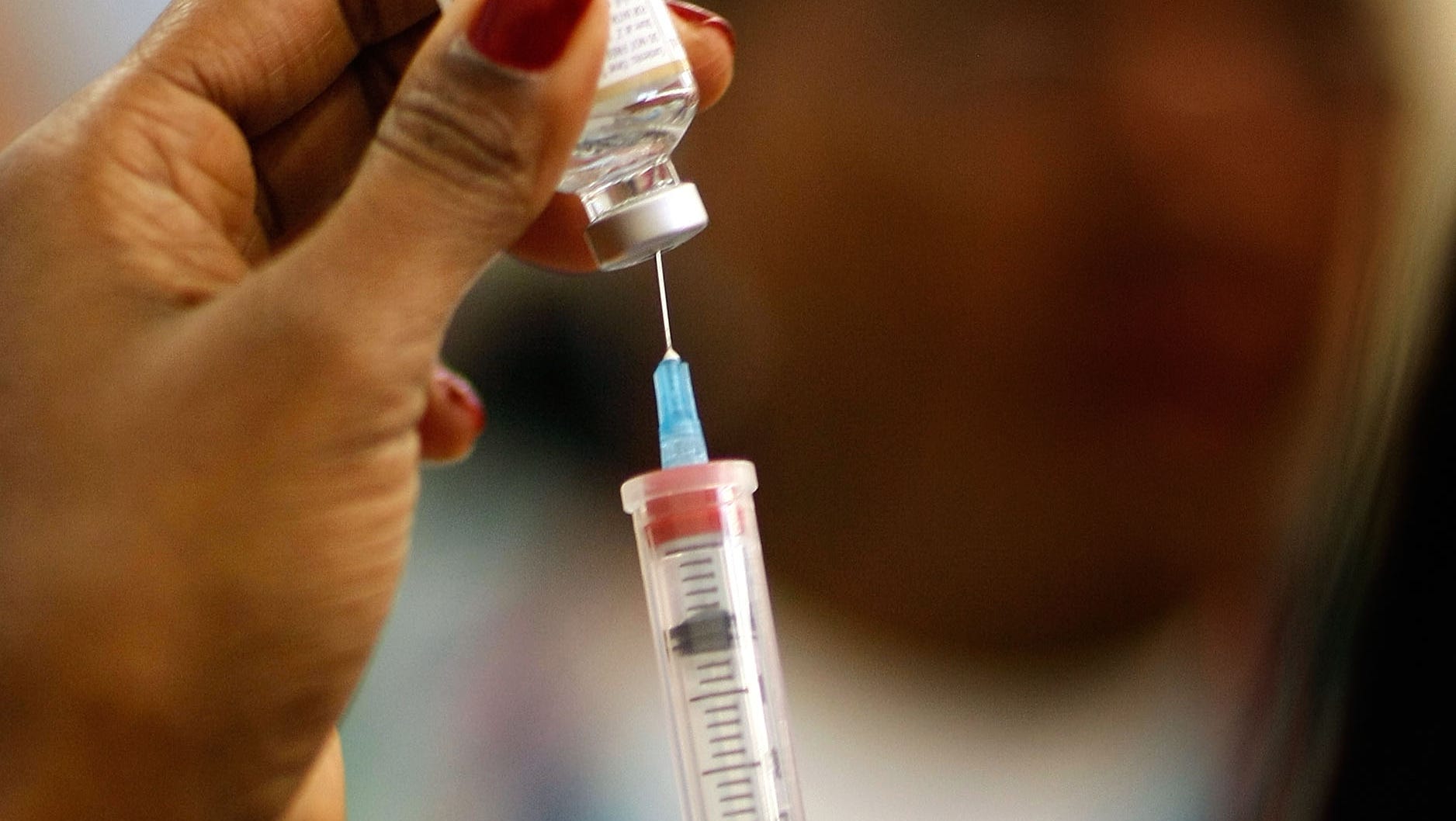US Vaccine Safety Under Scrutiny Following Measles Surge

Table of Contents
The Measles Surge and its Impact
Rising Case Numbers and Geographic Distribution
The alarming rise in measles cases isn't evenly distributed across the US. Several states, particularly those with lower vaccination rates, are experiencing significant outbreaks. This signifies a clear and present danger, transforming measles from a largely eradicated disease into a significant public health emergency. Keywords like "measles outbreak," "vaccine preventable disease," and "public health emergency" accurately reflect the gravity of the situation.
- Specific statistics on measles cases in different states: (Insert current, verifiable statistics from reputable sources like the CDC). For example: "As of [Date], [State X] reported [Number] cases, while [State Y] saw [Number] cases."
- Vulnerable populations: Infants too young to be vaccinated, individuals with weakened immune systems, and pregnant women are particularly vulnerable to severe complications from measles.
- Economic burden: Measles outbreaks place a significant strain on healthcare systems, leading to increased hospitalizations, intensive care admissions, and lost productivity due to illness and quarantines.
The Link Between Low Vaccination Rates and Outbreaks
The correlation between low vaccination rates and the severity of measles outbreaks is undeniable. The principle of herd immunity, where a sufficient percentage of the population is vaccinated to protect even those who cannot be vaccinated, is compromised when vaccination rates fall below a critical threshold. This allows the virus to spread easily, leading to larger and more sustained outbreaks. Keywords like "vaccine hesitancy," "herd immunity," and "vaccination rates" are critical to understanding this relationship.
- Herd immunity: Explaining herd immunity requires clarity. For example, “Herd immunity protects vulnerable individuals. If 95% of a population is vaccinated against measles, it's difficult for the virus to spread, even among those unvaccinated. This safeguards infants and those with compromised immune systems.”
- Factors contributing to low vaccination rates: Misinformation spread through social media, distrust in pharmaceutical companies and government institutions, and concerns about potential vaccine side effects all contribute to vaccine hesitancy.
Scrutiny of US Vaccine Safety and Misinformation
The Role of Misinformation and Social Media
The rapid dissemination of misinformation regarding vaccine safety, particularly through social media platforms, is a significant factor driving vaccine hesitancy. Anti-vaccine groups leverage social media's algorithms to spread unsubstantiated claims, often with devastating consequences. Keywords such as "vaccine misinformation," "anti-vaccine movement," and "social media influence" are relevant to this section.
- Examples of common vaccine myths: This section should actively debunk common myths using scientific evidence. For example, “The myth that vaccines cause autism has been repeatedly debunked by numerous large-scale studies.”
- Role of social media algorithms: Explain how social media algorithms amplify misinformation by prioritizing engagement over accuracy.
- Efforts to combat misinformation: Highlight fact-checking initiatives, public health campaigns, and media literacy programs designed to counter misinformation.
Addressing Concerns Regarding Vaccine Safety
Addressing legitimate concerns about vaccine safety is crucial for building trust. While serious side effects are extremely rare, transparency and factual information are essential. Reputable sources like the CDC and WHO provide comprehensive data on vaccine safety and efficacy. Keywords such as "vaccine side effects," "vaccine safety data," and "vaccine adverse events" should be incorporated here.
- Rigorous testing process: Explain the stringent testing and regulatory processes vaccines undergo before approval.
- Rarity of serious side effects: Provide statistics demonstrating the extremely low probability of serious side effects from vaccines compared to the risks of contracting the disease.
- Benefits outweigh risks: Clearly state that the benefits of vaccination far outweigh the extremely low risks of side effects.
The Importance of Vaccination and Public Health Initiatives
The Role of Public Health Campaigns and Education
Effective public health campaigns play a pivotal role in increasing vaccination rates and addressing vaccine hesitancy. Clear, accessible, and evidence-based information delivered through trusted channels is crucial. Keywords such as "vaccine education," "public health initiatives," and "community outreach" are important in this context.
- Successful public health campaigns: Examples of successful campaigns can be referenced, highlighting their strategies.
- Need for clear information: Emphasize the importance of clear and easily understandable information about vaccines.
- Role of healthcare providers: Highlight the importance of healthcare providers as trusted sources of information.
Governmental Response and Policy Recommendations
Governmental action is crucial in addressing the measles surge and promoting higher vaccination rates. Policies that support vaccination efforts and combat misinformation are essential. Keywords such as "vaccine policy," "public health policy," and "government response" are critical.
- Potential policies: Discuss policy options, such as mandatory vaccination laws for school entry, with consideration for potential challenges.
- Funding for public health campaigns and research: Stress the need for adequate funding for research and public health programs.
- Collaboration between agencies: Emphasize the importance of collaborative efforts between governmental agencies and healthcare providers.
Conclusion
The resurgence of measles in the US underscores the urgent need to address vaccine hesitancy and strengthen public health initiatives focused on US vaccine safety. The link between low vaccination rates and outbreaks is undeniable, and the spread of misinformation through social media exacerbates this problem. Combating vaccine hesitancy requires a multi-pronged approach: addressing concerns about vaccine safety with factual information, implementing effective public health campaigns, and exploring evidence-based policy changes.
To ensure vaccine safety and protect the health of our communities, we must all play a part. Learn more about vaccine safety from reputable sources like the CDC and WHO websites. Talk to your healthcare providers about vaccinations, and advocate for policies that promote vaccination and combat the spread of misinformation. Let's work together to improve US vaccine uptake and safeguard public health.

Featured Posts
-
 Aston Villa Transfer Target Souness Offers Insight On Rashford
May 03, 2025
Aston Villa Transfer Target Souness Offers Insight On Rashford
May 03, 2025 -
 Le Vatican Temoin D Un Echange Houleux Entre Trump Et Macron
May 03, 2025
Le Vatican Temoin D Un Echange Houleux Entre Trump Et Macron
May 03, 2025 -
 Wyjatkowe Wyroznienia Solidarnosc I Republika Analiza Porownawcza
May 03, 2025
Wyjatkowe Wyroznienia Solidarnosc I Republika Analiza Porownawcza
May 03, 2025 -
 Largest Heat Pump System Launched By Innomotics Eneco And Johnson Controls
May 03, 2025
Largest Heat Pump System Launched By Innomotics Eneco And Johnson Controls
May 03, 2025 -
 Ueberpruefung Der Lottozahlen 6aus49 Ziehung Am 12 April 2025
May 03, 2025
Ueberpruefung Der Lottozahlen 6aus49 Ziehung Am 12 April 2025
May 03, 2025
